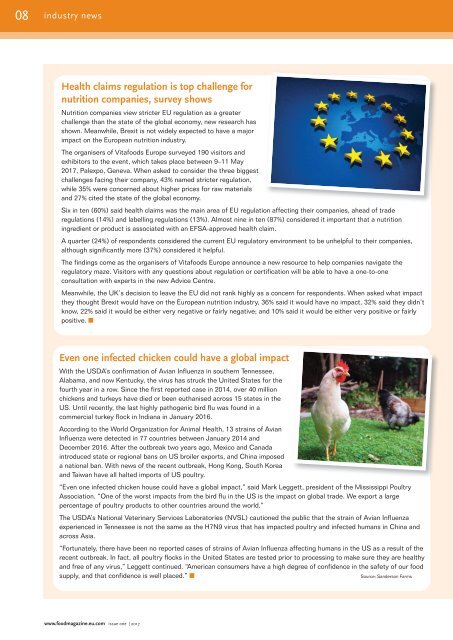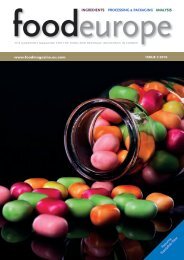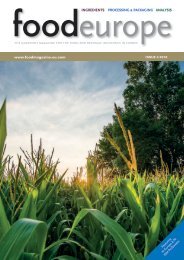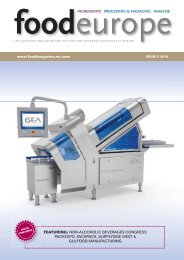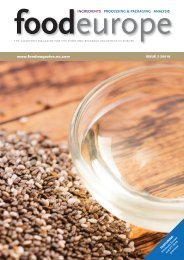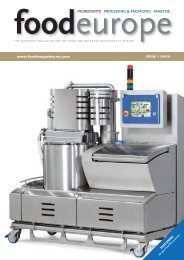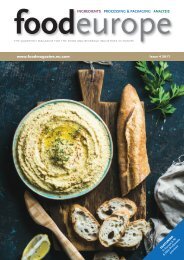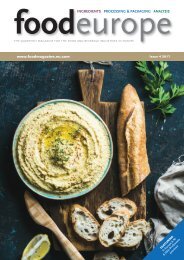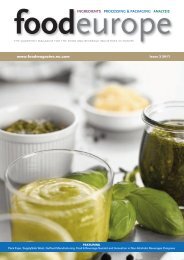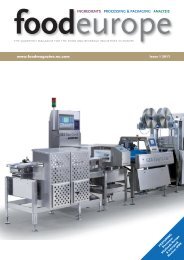issue 1 2017
Issue 1 2017 of FoodEurope Magazine
Issue 1 2017 of FoodEurope Magazine
Create successful ePaper yourself
Turn your PDF publications into a flip-book with our unique Google optimized e-Paper software.
08 industry news<br />
Health claims regulation is top challenge for<br />
nutrition companies, survey shows<br />
Nutrition companies view stricter EU regulation as a greater<br />
challenge than the state of the global economy, new research has<br />
shown. Meanwhile, Brexit is not widely expected to have a major<br />
impact on the European nutrition industry.<br />
The organisers of Vitafoods Europe surveyed 190 visitors and<br />
exhibitors to the event, which takes place between 9–11 May<br />
<strong>2017</strong>, Palexpo, Geneva. When asked to consider the three biggest<br />
challenges facing their company, 43% named stricter regulation,<br />
while 35% were concerned about higher prices for raw materials<br />
and 27% cited the state of the global economy.<br />
Six in ten (60%) said health claims was the main area of EU regulation affecting their companies, ahead of trade<br />
regulations (14%) and labelling regulations (13%). Almost nine in ten (87%) considered it important that a nutrition<br />
ingredient or product is associated with an EFSA-approved health claim.<br />
A quarter (24%) of respondents considered the current EU regulatory environment to be unhelpful to their companies,<br />
although significantly more (37%) considered it helpful.<br />
The findings come as the organisers of Vitafoods Europe announce a new resource to help companies navigate the<br />
regulatory maze. Visitors with any questions about regulation or certification will be able to have a one-to-one<br />
consultation with experts in the new Advice Centre.<br />
Meanwhile, the UK’s decision to leave the EU did not rank highly as a concern for respondents. When asked what impact<br />
they thought Brexit would have on the European nutrition industry, 36% said it would have no impact, 32% said they didn’t<br />
know, 22% said it would be either very negative or fairly negative; and 10% said it would be either very positive or fairly<br />
positive. n<br />
Even one infected chicken could have a global impact<br />
With the USDA’s confirmation of Avian Influenza in southern Tennessee,<br />
Alabama, and now Kentucky, the virus has struck the United States for the<br />
fourth year in a row. Since the first reported case in 2014, over 40 million<br />
chickens and turkeys have died or been euthanised across 15 states in the<br />
US. Until recently, the last highly pathogenic bird flu was found in a<br />
commercial turkey flock in Indiana in January 2016.<br />
According to the World Organization for Animal Health, 13 strains of Avian<br />
Influenza were detected in 77 countries between January 2014 and<br />
December 2016. After the outbreak two years ago, Mexico and Canada<br />
introduced state or regional bans on US broiler exports, and China imposed<br />
a national ban. With news of the recent outbreak, Hong Kong, South Korea<br />
and Taiwan have all halted imports of US poultry.<br />
“Even one infected chicken house could have a global impact,” said Mark Leggett, president of the Mississippi Poultry<br />
Association. “One of the worst impacts from the bird flu in the US is the impact on global trade. We export a large<br />
percentage of poultry products to other countries around the world.”<br />
The USDA’s National Veterinary Services Laboratories (NVSL) cautioned the public that the strain of Avian Influenza<br />
experienced in Tennessee is not the same as the H7N9 virus that has impacted poultry and infected humans in China and<br />
across Asia.<br />
“Fortunately, there have been no reported cases of strains of Avian Influenza affecting humans in the US as a result of the<br />
recent outbreak. In fact, all poultry flocks in the United States are tested prior to processing to make sure they are healthy<br />
and free of any virus,” Leggett continued. “American consumers have a high degree of confidence in the safety of our food<br />
supply, and that confidence is well placed.” n<br />
Source: Sanderson Farms<br />
www.foodmagazine.eu.com <strong>issue</strong> one | <strong>2017</strong>


